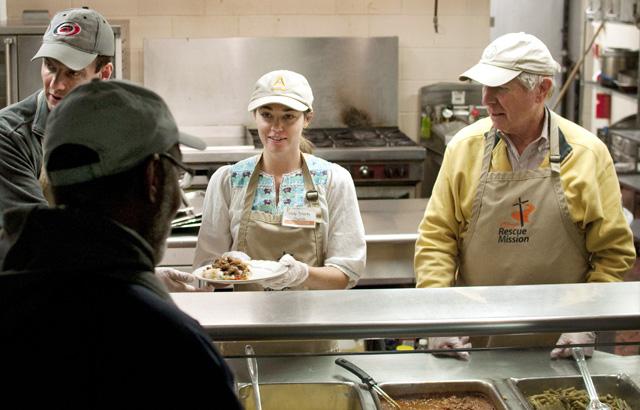The Raleigh Rescue Mission, a nonprofit Christian organization located in downtown Raleigh, provides aid to many homeless by encouraging a strong faith and work ethic.
The mission, which includes 100 beds, 60 for women and children and 40 for men, is one of the largest locations downtown with the capacity and funds to provide its clients with life-changing programs.
The mission got its start in 1961 when a small group of community members became concerned with people living on the streets. According to Lynn Daniell, executive director of RRM, the typical homeless people at that time were alcoholic men.
The mission later bought a two-story house that was able to feed about 18 people. The housing space was added to the mission in 1976 and has operated its own clinic for the last 10 years.
Although the stereotypical homeless person in decades past was an alcoholic male, according to Daniell, homelessness today is much more far-reaching.
“Homelessness does not discriminate, man or woman, black or white, young or old … we’ve seen it all. It is all across the board now,” Daniell said.
In addition to experiencing homelessness, a number of people may also suffer from a range of mental illnesses. Homelessness often goes hand-in-hand with various mental and physical problems, such as drug addiction, according to Daniell.
“We see, or recognize, a lot more mentally ill than before,” Daniell said. “We see a lot of people who are dually diagnosed with some type of mental illness and addicted to alcohol or drugs,” Daniell said.
Daniell explained that many people in the past believed that the solution to problems like alcoholism or homelessness was the need for harsher discipline.
“Now we know people may also have bipolar disorder or be depressed,” Daniell said.
Daniell said that while RRM works on rehabilitation by focusing on the whole person, physically, mentally and spiritually, there are some people who are simply unable to help themselves, in which case the mission attempts to help in other ways.
“We will work with them to get disability, which may go in conflict with some beliefs, but they just can’t support themselves,” Daniell said.
The mission operates both an emergency and permanent facility for women and children, and a permanent unit for men. While living at the mission, residents are expected to do work assignments like cleaning their rooms and doing grounds work outside, according to Daniell.
Daniell said that while the mission provides food and safety, it is not a hotel, and residents must constantly be striving to make positive change in their lives. In addition to a place to stay and worship, residents can receive medical help, including psychological case work with a counselor. The mission also has a children’s center where working mothers can leave their kids.
The mission has about 51 staff members, 36 full-time and 15 part-time. In addition, about 100 individuals and up to 50 groups volunteer every month, according to Holly Cook, director of volunteer ministry.
Cook said that while most people first think of volunteering as serving food, there are a number of ways to volunteer at the mission, including tutoring and babysitting.
Reiterating the idea that homelessness affects diverse groups of people, Cook said tutors are needed for all levels of reading and math. According to Cook, some residents may have a Master’s degree while others cannot read at all or be at an extremely low reading level.
Cameron Hicks, 29, has been volunteering with RRM for a year and a half and said after volunteering once with her Bible study group, she then reached out to the mission to continue serving.
“I love the people here. I like the people who work here and the people in the program. I like to give back and like spending time with people,” Hicks said.








